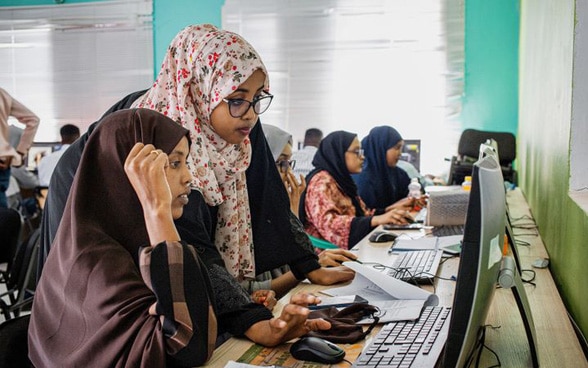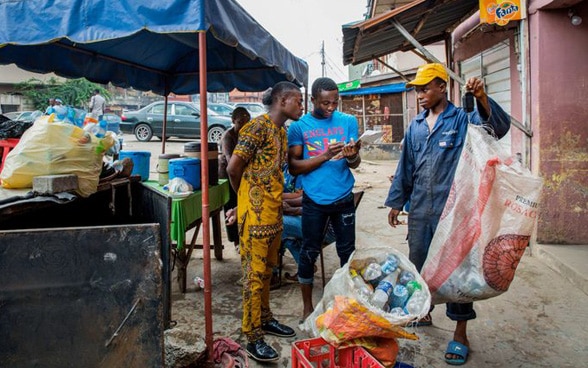Better jobs for a better world
Decent work worldwide is considered a key factor for reducing poverty within international development policy. Cooperation with the private sector is an important plank but there are major challenges – and the pandemic has only added to them.

Cambodian street vendors in Phnom Penh: over two billion people worldwide work in the informal sector. © Luke Duggleby/Redux/laif
Over the last ten years, Collet Wemba has experienced many improvements at work. She has been working since 2012 for a snack food manufacturer producing potato chips located on the outskirts of South Africa's capital Johannesburg. "Initially, I and many of my colleagues worked on temporary contracts, which would go on being extended," says the 33-year-old. She recalls that overtime hours weren't paid and employees would be sent home when there was too little work. She even had to pay for the compulsory work clothing herself. She says she earned the equivalent of about 80 centimes an hour in the first year.
Awareness of rights is crucial
In 2015, Wemba approached the Casual Workers Advice Office (CWAO), an organisation in Johannesburg that provides legal counselling to temporary workers and others in precarious jobs. "They helped us to communicate our demands to the company's management," says Wemba. That set the ball rolling.
"Our working conditions improved and our wages were raised a little." In 2018, she and some of her colleagues were given permanent jobs at the company – after six years of temporary work – following arbitration proceedings with CWAO's support.
"My life has changed ever since," says Wemba. It isn't just the better working conditions. "I no longer remain silent when it comes to standing up for my rights or those of my colleagues." What Wemba did was to use the right to freedom of association, one of the core principles of the International Labour Organisation (ILO) (see box). "It has been empirically demonstrated that wages and standard of living are higher in places where there are strong unions," says Joachim Merz, project manager for Southern Africa and Bolivia at Solidar Suisse. Solidar Suisse is a Swiss development organisation that campaigns for decent work worldwide and supports CWAO in South Africa.
"Better work does not just mean better wages, it also includes social security and being aware of one's rights," says Merz with reference to the Decent Work Agenda that the ILO adopted in 1999. This outlines four core elements of decent work: respect for rights at work, fair income, social protection and social dialogue about workplace conditions.
The Decent Work Agenda is now an integral part of international development policy, and decent work is one of the goals of the 2030 Agenda for Sustainable Development. Switzerland has also defined the creation of decent jobs as a priority under its Strategy for International Cooperation 2021–24.
International Labour Organization (ILO)
The ILO was founded in 1919 with the objective of improving working and living conditions for all people. Its eight core conventions are an international frame of reference for minimum standards at work. They are based on four fundamental principles: freedom of association and the right to collective bargaining; elimination of forced labour; abolition of child labour; and the elimination of discrimination.
207 million global unemployed
The issue has acquired greater urgency in the context of the global world of work. Many countries exhibit high levels of unemployment and informal employment, poverty and inadequate social protection. The COVID-19 pandemic has worsened this situation. The ILO estimates that there will be 207 million unemployed in 2022 compared to 186 million in 2019. It considers the situation of women and young people to be of even greater concern – population groups that are already amongst the most vulnerable.

The question is how to create jobs at a time when the world of work is in a phase of major upheaval and uncertainty. "A key aspect is to strengthen the local private sector," suggests Guido Beltrani, co-head of the SDC's Inclusive Economic Development Team. About 90% of global jobs are created by private companies. "In many cases, the problem is that companies have no access to finance and consequently cannot grow and create more jobs."
This is where the SDC can engage. A concrete example is an initiative that facilitates access to loans for small and medium enterprises in the agricultural sector in parts of East Africa. Another project aims to facilitate better market access for rural communities, for instance by promoting the use of mobile technologies that provide smallholder farmers with market information, allowing them to obtain better prices for their products.
Strengthened cooperation with the private sector
Apart from supporting local companies, the SDC also strengthens cooperation between companies in Switzerland and many other countries. "This allows private sector resources, innovation and funding to be mobilised," says Beltrani, "which is critical for implementing the 2030 Agenda." The SDC has consistently been expanding its partnerships in recent years. Last year, about 140 active projects were being implemented with the private sector. Partners include multinational corporations such as Roche as well as SMEs and financial service providers.
But collaboration isn't possible with every company. NGOs have repeatedly criticised the lack of transparency relating to environmental and human rights. "Before entering into any partnership we do an exhaustive analysis," says Beltrani. Three main areas – environment, social justice and corporate governance – are reviewed for potential risks. "Among large companies, these risks are usually found in their value chain."
A database is used to find out about the number of problems in these areas that a company has faced in the past to determine the risk of cooperation with that partner. Subsequently, it is analysed whether the company recognises the relevant risks and takes preventive action.
Better conditions for the informal sector
Merz from Solidar Suisse also agrees that it is necessary to involve the private sector, although with one important caveat: "Social dialogue and collective bargaining must be guaranteed. A company must be willing to sit at the table with employees or unions to improve basic conditions through decent wages and social protection."

Solidar Suisse believes that dialogue can be used to improve working conditions even in the informal sector. This is a sector that employs more than 60% of people worldwide, often without written employment contracts and social protection. "In some projects we attempt to work with local authorities to find out how to improve conditions for informal workers," says Merz.
This could include allowing street vendors to sell their products legally, providing better internet connectivity or offering financial incentives, such as tax breaks, to start-ups. "Informal work will always exist," says Merz, "so we must find a way to make this work as decent as possible."
Article by Samanta Siegfried, published in One World 02/2022
